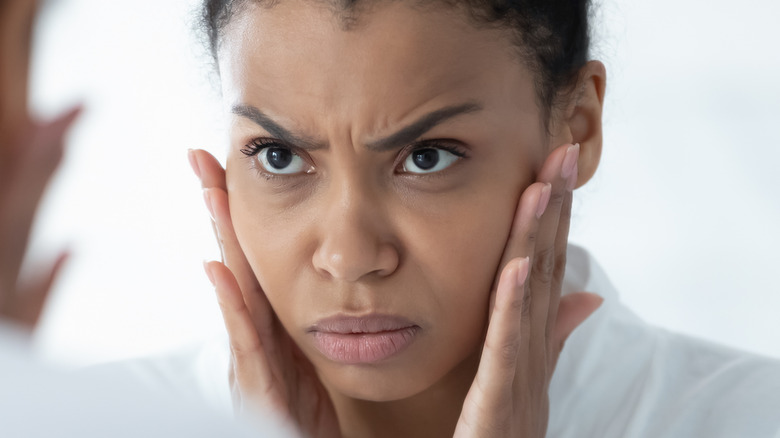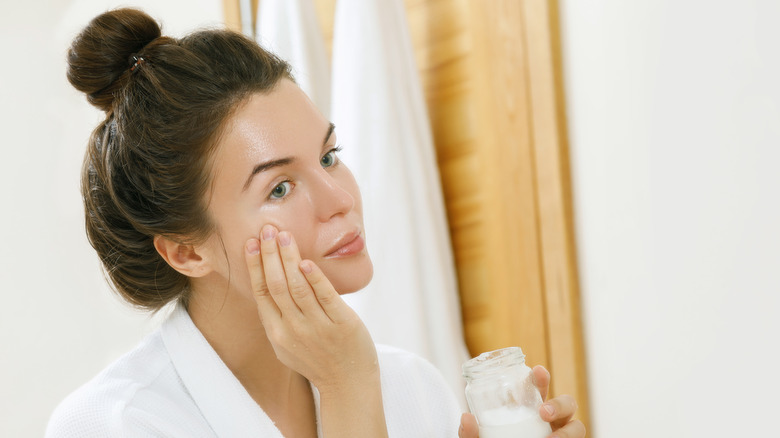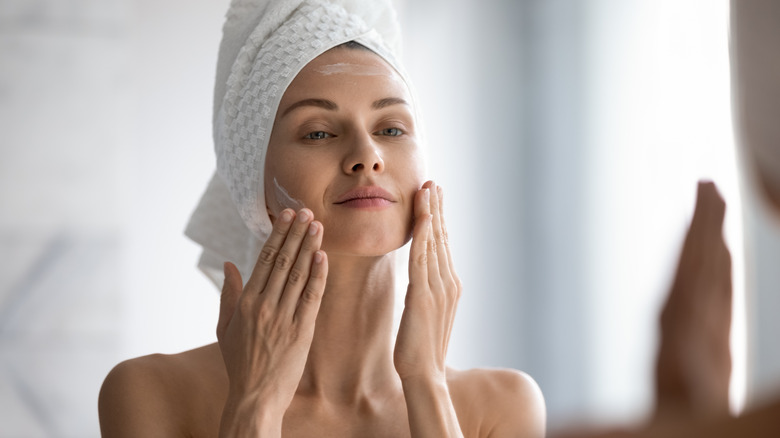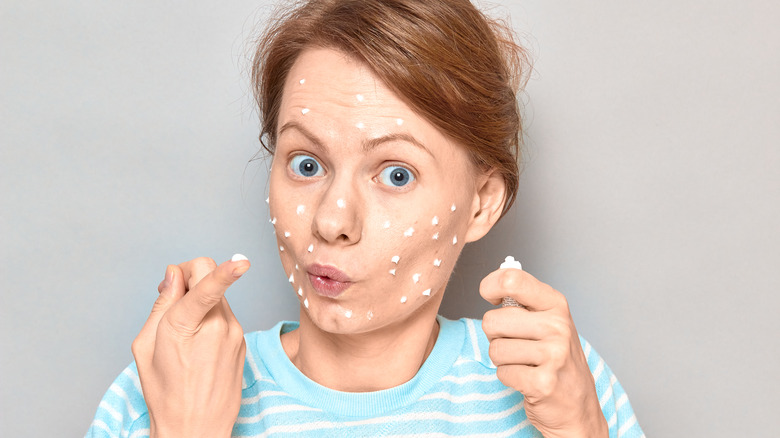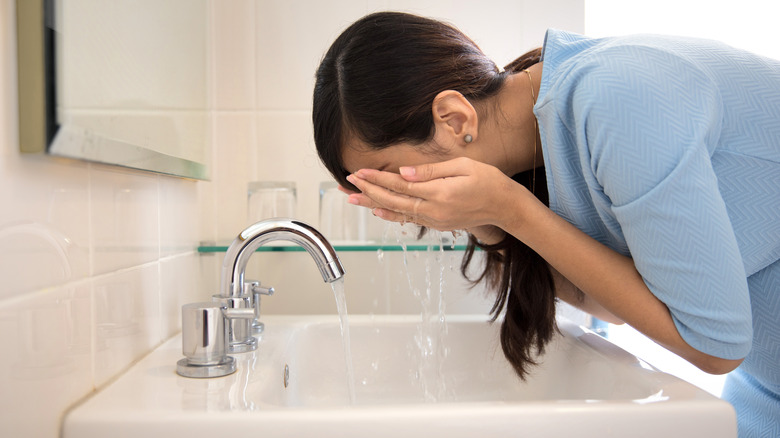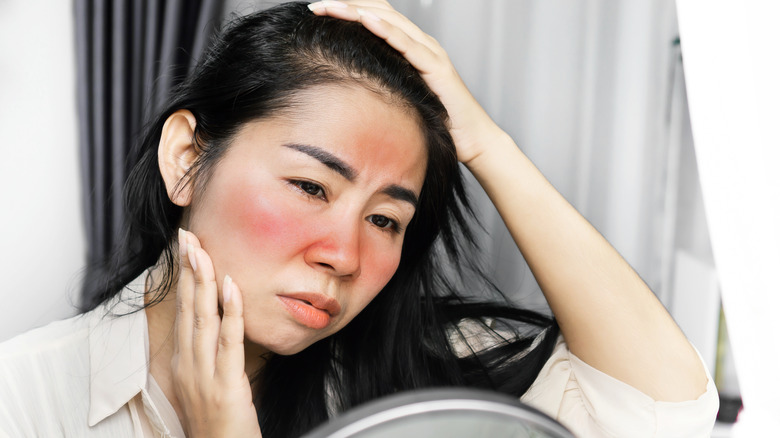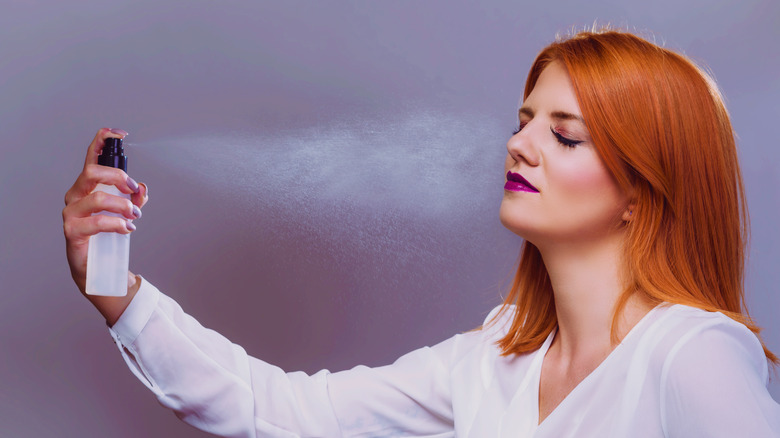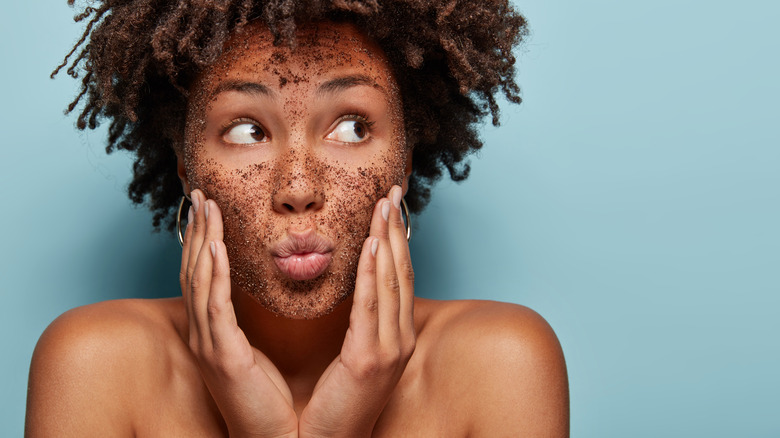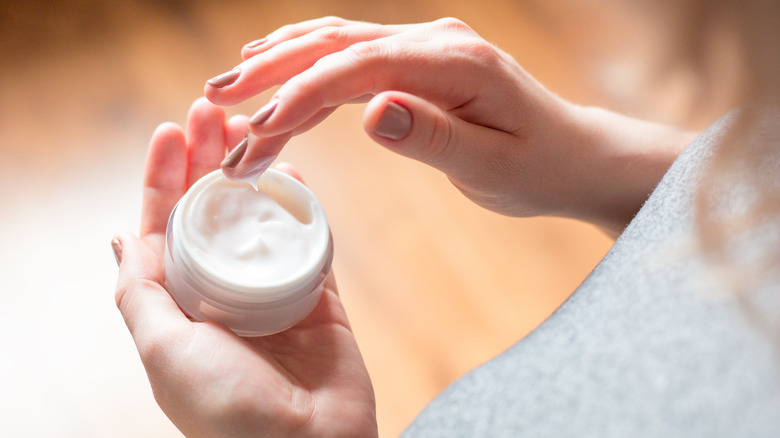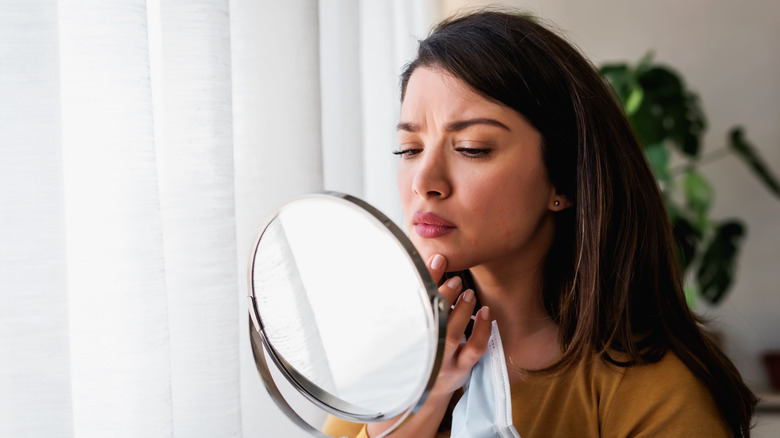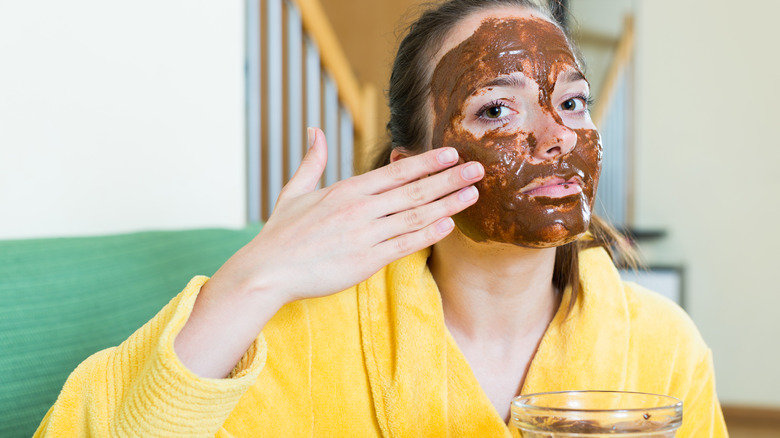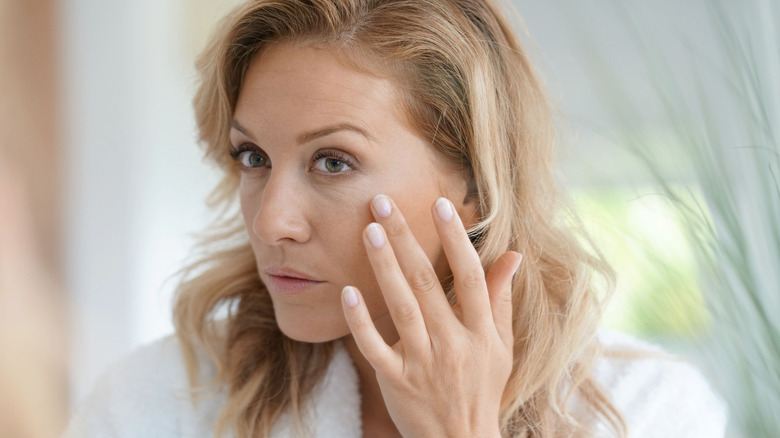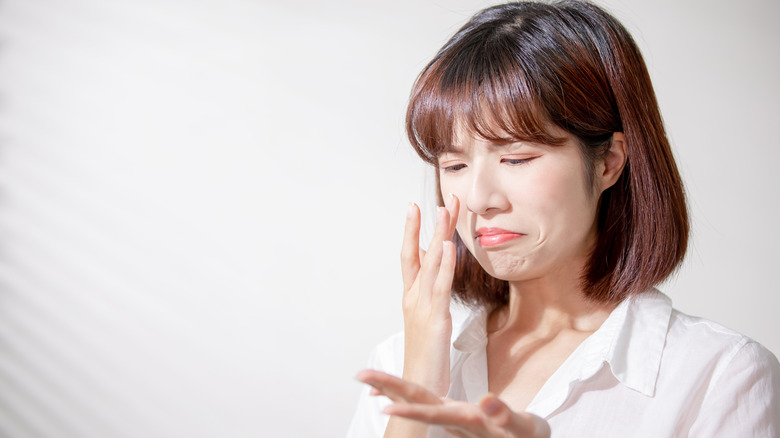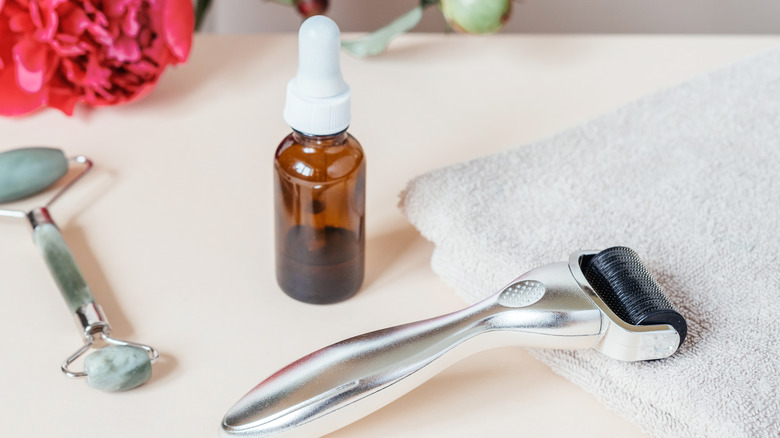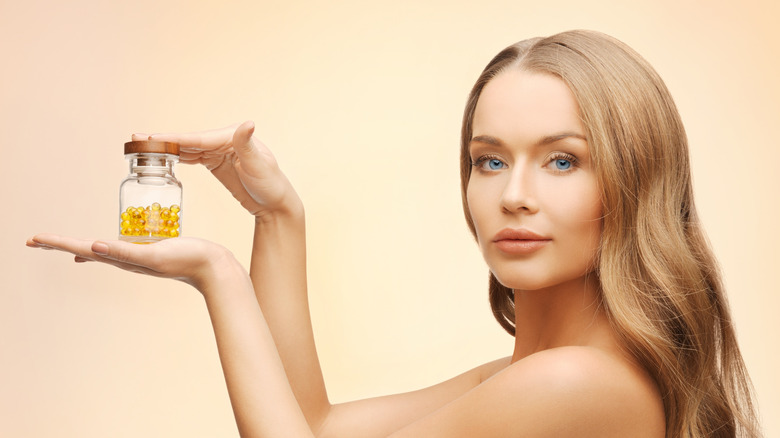Bad Beauty Advice To Avoid For The Sake Of Your Skin
It's hard to know which online beauty advice to follow, so oftentimes we just try things out for ourselves. But when it comes to caring for your skin, some popular tips can have serious consequences. Though some are obviously bad, such as exfoliating with sandpaper, others may be worth avoiding simply because certain people have severe reactions. You won't know until you try a skincare trend whether you are prone to negative side effects from it, but much of the time, the risk isn't worth it.
You can arm yourself against bad beauty advice by learning which techniques have been debunked or are otherwise questionable. Even if some of these habits have already become part of your routine, it might be time to rethink them if there is potential to cause damage. Everyone's skin is different, but it's best to stay on the safe side to protect the one epidermis we have. Research presented by the NIH tells us that our skin carries out many functions that are important to our well being, and can reflect the state of our health at a glance. Be sure not to put this vital part of your body at risk over a beauty fad.
Using coconut oil as a moisturizer
Although coconut oil offers many uses and benefits, as detailed by Prevention, it actually isn't the best choice for a facial moisturizer. This and other oils are comedogenic, meaning they can clog up your pores and lead to breakouts. Dermatologic surgeon Dr. Dendy Engelman told Byrdie, "Coconut oil is considered a four on the zero-to-five comedogenicity scale, which is a list of pore-blocking ingredients graded from non-pore-blocking to incredibly pore-blocking as the number gets higher." By all means, use it on your cuticles or split ends (though that might not be the best idea either), but with a score like that, use it on your face at your own risk.
Dermatologist Dr. Nava Greenfield suggested that coconut oil might not be the best choice for acne-prone skin, since it has not been shown to improve inflammation or cysts for people with acne. If you insist on using it still, Dr. Engelman says you should at least make sure all traces of it are removed with a cleanser before it can solidify and clog your pores. You've been warned!
At-home aspirin peels
One piece of trending skincare advice to avoid is the at-home facial peel with baking soda and aspirin, which contains acetylsalicylic acid. YouTuber Amanda Bellantoni demonstrated the process of putting together this "DIY chemical peel" to "reduce acne" in a video on her channel. She said you will "feel it working," and endorsed the treatment. This process was also shown on "The Dr. Oz Show," which may have led to its popularity among some beauty influencers. But is it a good idea?
Skincare professionals agree that if you try this peel, you may find yourself facing terrible side-effects, such as chemical burns. Dermatologist Charles Crutchfield told NewBeauty, "Putting an acid on your face in an unsupervised environment is just asking for trouble. We do not offer peels like this; we fix the disastrous aftermath of facial chemical burns." Imagine trying to improve your skin and ruining it in the process! If it isn't good enough for a dermatologist, it probably shouldn't be good enough for you.
Remember: use aspirin only as directed — just follow the directions on the bottle!
Applying toothpaste to zits
Think twice before applying toothpaste to your acne. Though this beauty tip has been passed around for decades, you can consider it busted. L'Officiel reports that this beauty hack was conceived out of the idea that since zits are oily, toothpaste can be used to dry them out and speed up your return to a clear complexion. However, toothpaste can be made with bleach, baking soda, and other ingredients that are likely to do more harm than good for your skin.
As Dr. Rachel Nazarian of Schweiger Dermatology Group put it to Byrdie, "Keep in mind that your teeth are ranked amongst the toughest substances in your body, and we're using toothpaste to clean them. Your skin, in contrast, is incredibly delicate. Using a cleanser that's meant for teeth can disrupt the pH balance of your skin and irritate it greatly." So even if some celebrity is saying that this is their best-kept secret, you may want to keep your distance from this beauty tip. Skin irritation, and perhaps worse, is no improvement compared with waiting for a zit to heal naturally on its own.
Using lemon products on your face
Though some online advice suggests that lemons offer complexion-boosting benefits, including facial lemon products ranked on Influenster, the negatives may outweigh these. Lemons are highly acidic, which can ruin your skin's delicate pH balance. They're also highly phototoxic, which increases the risk of sunburns and irritation should you venture outside. If you've ever wondered why some products that lighten hair include lemon juice, now you know.
Elle Australia explained that another reason you may want to think twice before slathering some lemon on your face is the potential of getting one especially high in citric acid. In other words, since you're unable to know which lemons are more or less acidic, you're playing roulette each time you incorporate one into your skin routine. Certain lemons will pose a greater risk than others.
Some publications, such as Women's Health, do offer their endorsement with a disclaimer, advising that those with sensitive skin should perform a patch test before using facial products with lemon. This ought to serve as a warning, or even a red flag, for those careful enough to do some research. These fruits are not to be trifled with!
Washing your face often
Though we're typically advised to wash our face at least once per day, you can get too much of a good thing. Over-washing can cause your skin to dry out and even peel or flake. As Byrdie reports, ideally you want your skin to feel dewy rather than tight, and if you strip away your skin's natural oils too often through frequent washing, you may trigger consequences like rashes or adult acne. Have you been seeing signs of irritation from over-washing?
If you've been noticing more oil production and breakouts on your skin, washing your face too much may be the cause. Really, we don't need to be washing our face more than once per day, unless we're exposed to irritants which need to be washed off, according to some experts. Allure says that if you're seeing dry skin and redness when you wake up, you may want to skip your morning facial rinse. There are steps you can take the night before to set yourself up for glowing morning skin, of course.
PopSugar Beauty suggests that there is a right way to wash your face as a part of your nightly routine, including aftercare with toner, serum, and moisturizing night cream. The time skin is most dehydrated is at night while we sleep, so this may be the best time to wash and replenish our skin. Make it count.
Using sunscreen to contour your face
On TikTok, some users have recommended that you apply sunscreen selectively, as a way to burn or tan the skin on your face where you want to see contouring. It might save you some time in front of the mirror, but this process exposes those unprotected areas to solar radiation, which can be harmful enough to cause premature aging and potentially increase your risk of skin cancer. Yikes.
The popularity of sunscreen contouring seems to have originated with Beyoncé's makeup artist, Sir John. He told Vogue Australia about his process in 2017, saying, "It's like permanent contour for at least three weeks." He did point out, though, that sun exposure can contribute to visible aging and so having full protection is essential. Even if Sir John uses a stronger SPF on the areas he wants to see highlighted, it still isn't a good idea to leave other parts of your face to purposely bake under weak sunscreen.
Dr. Gian Vinelli talked about this fad in a video posted by Rochester Regional Health on Facebook, saying, "You will definitely be putting yourself at risk for skin cancer." Other dermatologists agree, with some telling Refinery29 that the treatment is unsafe and that the resulting contour is actually just a sign of skin damage. The long-term risks are certainly not worth it for a temporary contour.
Getting makeup to last all day and night
Although there's lots of advice available online for getting your makeup to last day and night, and even into the following day, it isn't a good idea.
Mario Dedivanovic, who is a makeup artist for Kim Kardashian, told Marie Claire several tips for keeping your makeup looking great for up to a day after its application, including overnight maintenance. Though many recommend setting sprays for holding makeup tight (Bustle says do it twice for extra hold), Dedivanovic prefers loose powder. He also says to skip some of your normal skincare habits if you're trying to get a look to last. That means no moisturizers before doing your makeup. Your skin is locked in place under makeup for a day or more with his tips. Makeup forever! Why not?
Well, your skin needs to breathe, as it has functions to carry out, which can be hindered by layers of makeup, according to PopSugar Beauty. The publication reports that blocking skin with foundation and powder is one way to clog pores and set yourself up for acne and dry patches. Even if you sleep on a silk pillowcase and wash your face as soon as you no longer need the makeup, you can't easily undo what's been done. Over the course of that time, your skin has been drying out, your makeup settling deep into any lines and wrinkles, and you could end up with blackheads or inflammation. So beware advice that pushes you towards keeping your makeup on for a day or more, because it might become a regrettable habit.
Exfoliating too much
Many videos online display complex beauty routines that involve multiple rounds of scrubbing and exfoliation. While it might seem like good technique to keep skin buffed out, it's important to note that over-exfoliating may cause irritation and redness. Experts told Byrdie that cleaning out your pores through exfoliation helps with cell turnover and circulation, and is an important step to take to combat aging skin. But how often should we be exfoliating? Their answer is two to three times per week.
If your regular skincare routine includes daily exfoliation, or even multiple rounds of exfoliation in one day, your skin may be suffering. Vogue suggests that signs of over-exfoliation include skin looking much shinier than normal or even a bit "too glowy." The consequences won't show themselves immediately, but you could eventually be facing dry skin and rashes from overexposing these sensitive layers of skin. Remember that your skin is delicate, and putting it through the constant stress and trauma of harsh scrubbing may only increase this sensitivity in the long run.
Trying tons of new products
Though you might be tempted to try some new miracle skin cure every time one is recommended, you should know that doctors advise you to wait at least two weeks between introducing new products. If you switch too much, your skin may become irritated — plus, you won't know which products work if you don't give your skin a chance to respond one way or the other. Self tells us that switching up skincare products too often can actually "slow your progress" and the results you see from any of them. Consistency is key when it comes to your beauty routine, and it can take anywhere from four to eight weeks to really know if your new serum or moisturizer is working for you.
According to Skincare.com, a good marker to follow when changing a product you have in rotation is to do it seasonally. That way, you know you've given your existing products a chance to show you what they can do, and you can look forward to incorporating something new each time the seasons change.
Using milk of magnesia to treat acne
You might be shocked to learn that some people have been using a laxative product to treat their acne. Allegedly, milk of magnesia can do this and more. It is also said to be useful for minimizing the appearance of pores, and some beauty gurus recommend incorporating it into your beauty regimen to see immediate results. This advice may work for some, but others suffered from contact dermatitis or irritation. VeryWell Health also states that there's nothing that proves milk of magnesia has positive effects on the skin, noting that no formal studies have demonstrated support for its use as a topical facial product. In other words, the claims that it can rid you of acne remain unproven.
To NewBeauty, Dr. Heidi A. Waldorf shared that, though milk of magnesia does appear to soak up excess oil, this degreasing property doesn't negate the fact that it's intended for use in the gut rather than on the face. You're playing with the possibility of serious irritation when you use this product as a beauty tool. One rule you might try to follow is not to use products on your face that are intended for totally different regions of your body.
Cinnamon face masks
Some beauty influencers have touted the clarifying benefits of using a facial mask with honey and cinnamon, but not everyone who tried it had a positive experience. Although cinnamon does have some positive side-effects, it can also be very irritating and even lead to skin burns. Dermatologist Dr. Doris Day told SheKnows her view on using cinnamon in a facial mask, saying, "You can probably even get blisters. It's a spice. If you put pepper on your skin, you can burn your skin."
Metro UK reports that cinnamaldehyde is the compound in cinnamon which causes irritation and can activate your immune response in the form of itchiness or swelling. You may have felt it before as the burning and tingling you might experience if you tried to eat a teaspoon of cinnamon straight out of the bottle. The message is clear that cinnamon is not something you should be using as a facial product. If influencers continue demonstrating the technique for their fans, they will surely keep receiving blowback when some of those fans get burned.
Using full-coverage foundation instead of sunscreen
Even if your foundation includes SPF, it may not be enough to truly protect your skin from sun damage. Many who rely on foundation alone miss key areas around the eyes and, of course, aren't reapplying their foundation the way you would with a sunscreen. Johns Hopkins Medicine puts it plainly, telling us that the SPF in makeup, "is not enough to protect your skin." Instead you'll want to use a 30 SPF sunscreen. They do suggest that if you are staying mostly indoors, you may not require a second application of sunscreen.
Self reports that the main issue with makeup SPF is that it tends to only protect us from UVB rays, leaving us vulnerable to UVA. Since UVA tends to be responsible for more of the skin cancer and aging consequences we see, protecting from these rays is key. So your best bet is to thoroughly apply a strong sunscreen before you put on foundation.
Skipping moisturizer for oily skin
You may have heard that if you have oily skin, you can skip the step of applying moisturizer. Dermatologist Rajani Katta supports this view, and has said, "For people with oily skin on their face, there's no need to moisturize." But this may not be good advice to follow, because even oily skin can be lacking in hydration, particularly in months when the weather is dryer. It's all about finding the right moisturizer for your particular skin.
PC Dermatology says you should moisturize even if your skin is oily, because the point of moisturizing is to form a protective layer which keeps moisture locked in to hydrate skin throughout the day. Water-based products tend to be a good choice for oily skin, because they are lightweight and less likely to trigger acne and clogged pores. Just because your skin is a little hyperactive with the oil production, doesn't mean it should be hung out to dry.
Mixing chemical peels and microneedling
Although some clinics like Sculpt MD recommend the combination of chemical peels and microneedling as a long-term treatment, the two should not be used at the same time. It's easy to misunderstand and skip over the part where experts say you should space these processes out by weeks to see results and prevent damage. Though some advise using these treatments in concert with each other, leaving significant time between each treatment helps to avoid damaging your skin and even causing hyperpigmentation.
Despite the warnings, some engage in one right after the other, or at the very same time, to the dismay of dermatologists and other skin experts. Esthetician Cassandra Bankson responded to one TikTok with her own YouTube video in which she says microneedling while administering a chemical peel is a "great way ... to destroy your skin." Better to trust the people who have trained in skincare than to run risky experiments on your own face.
Taking L-Tyrosine to get a tan
Just because you can buy L-Tyrosine over the counter, doesn't mean you should. Some beauty influencers have been recommending you use this amino acid as a tanning aid, despite lack of evidence that it can produce a tan at all. NewBeauty asked dermatologists to weigh in on the product, and the verdict is that this is nothing more than an unverified trend. In fact, dermatologist Jacquiline Habashy referenced a study which said the pills not only fail to work and were even considered potentially harmful by the FDA.
In addition to being used as a beauty product, L-Tyrosine has been touted by some TikTok users as "natural adderall." Shape reports that although it can give some people energy, it isn't intended to work as a treatment for ADHD either. This one supplement is making the rounds and stirring up gossip, but it certainly isn't going to be making you tan any time soon.
